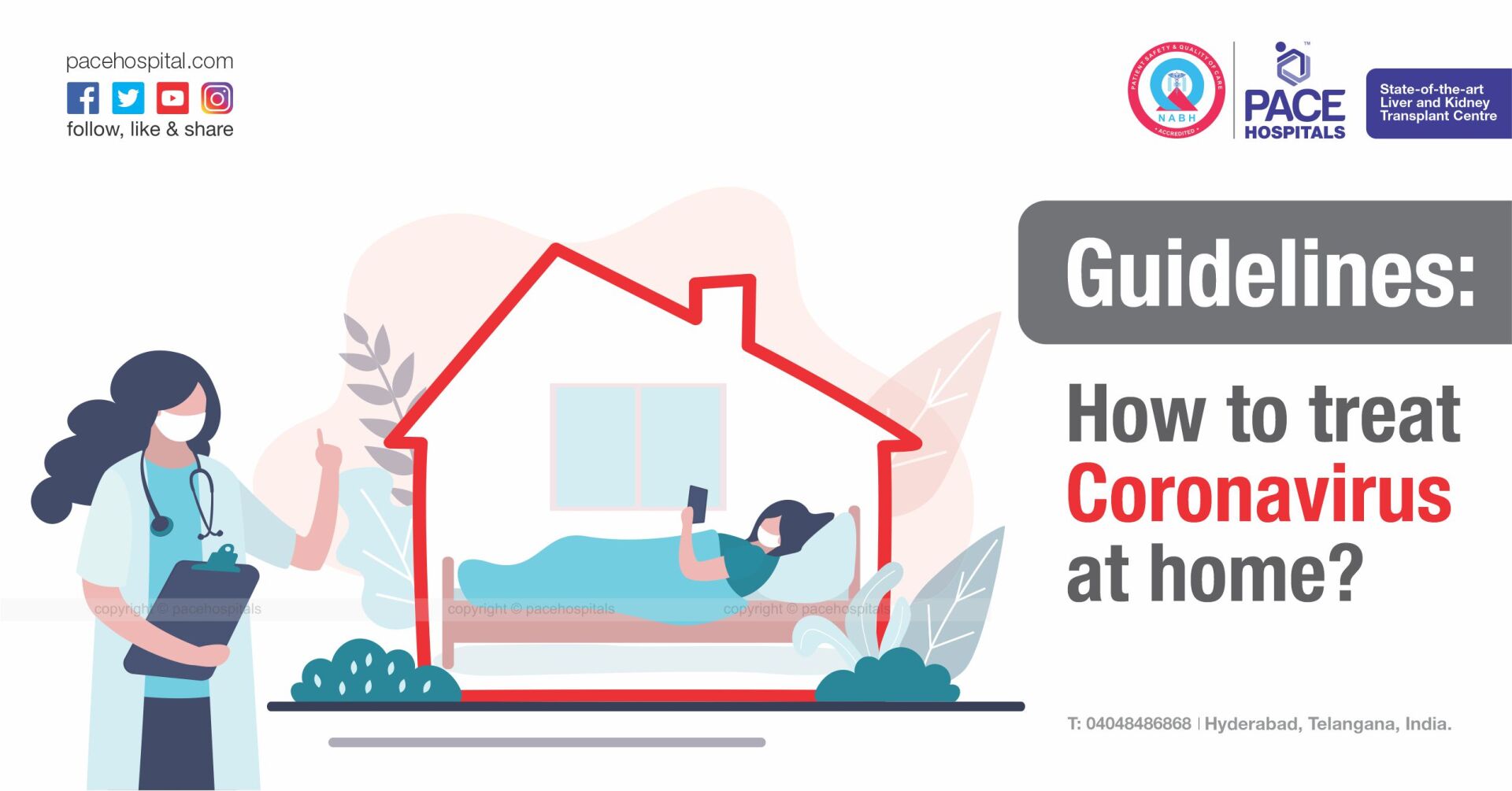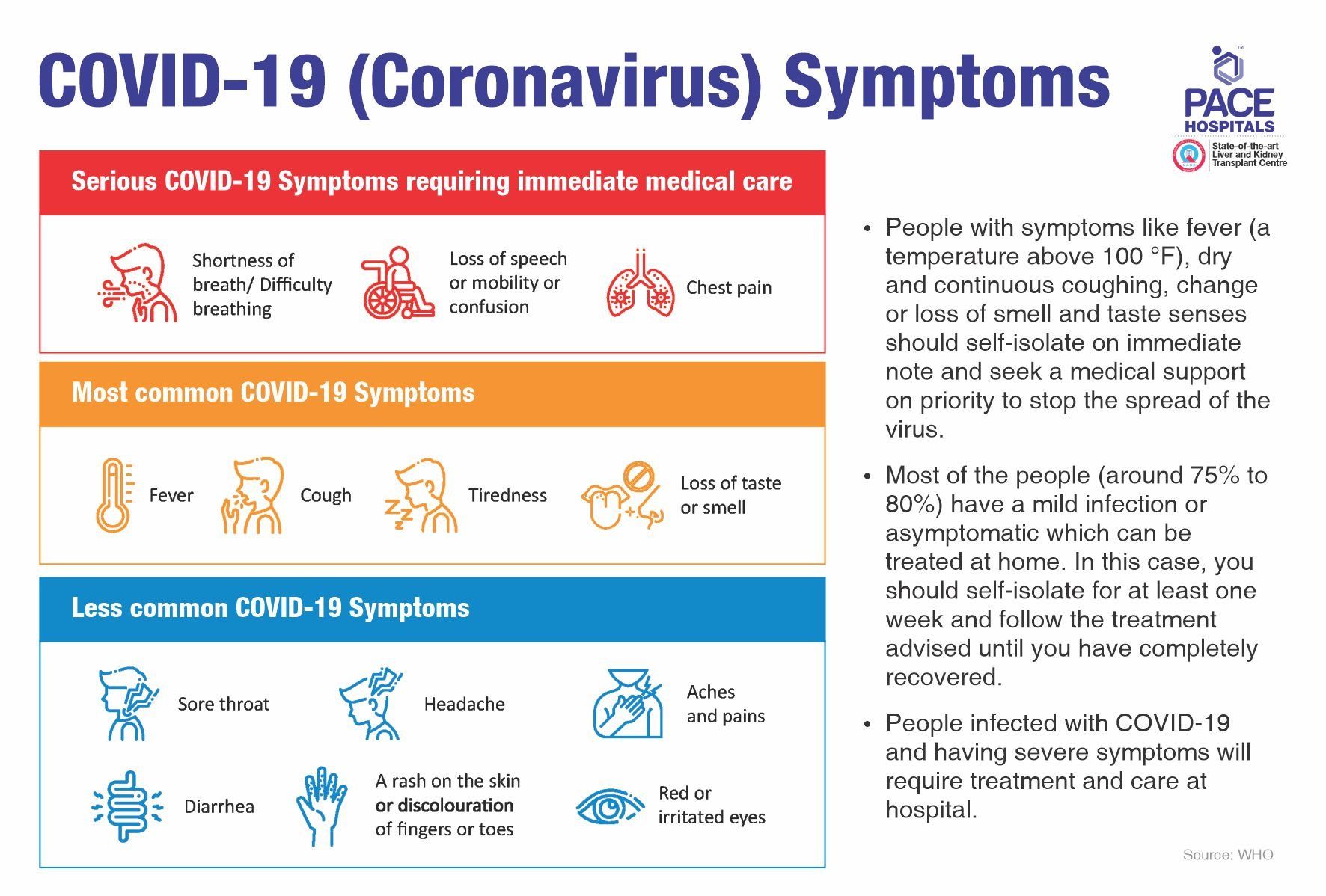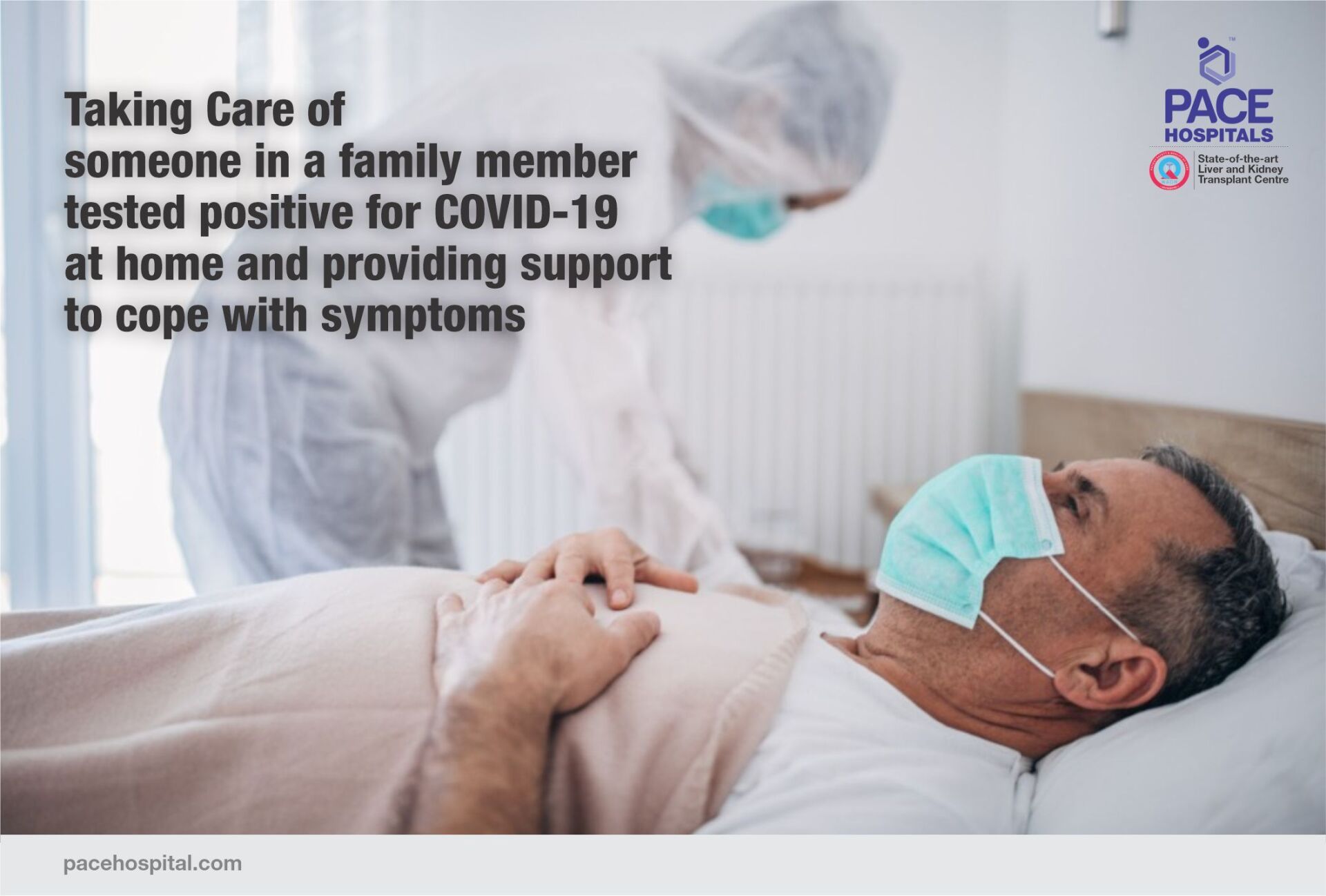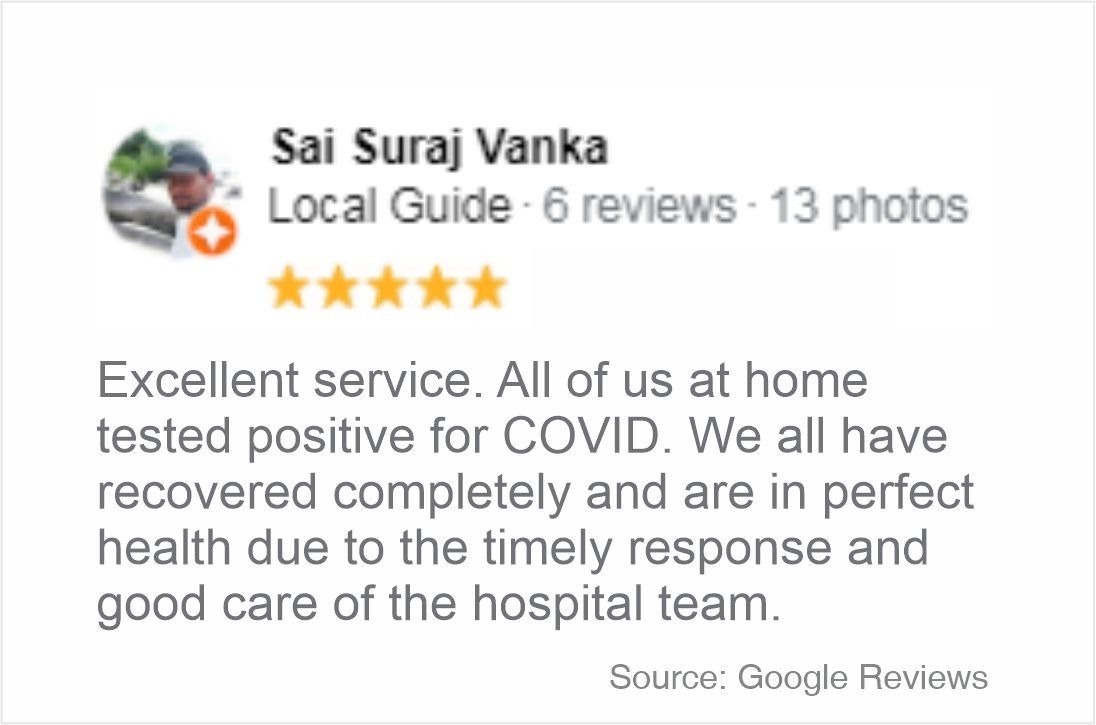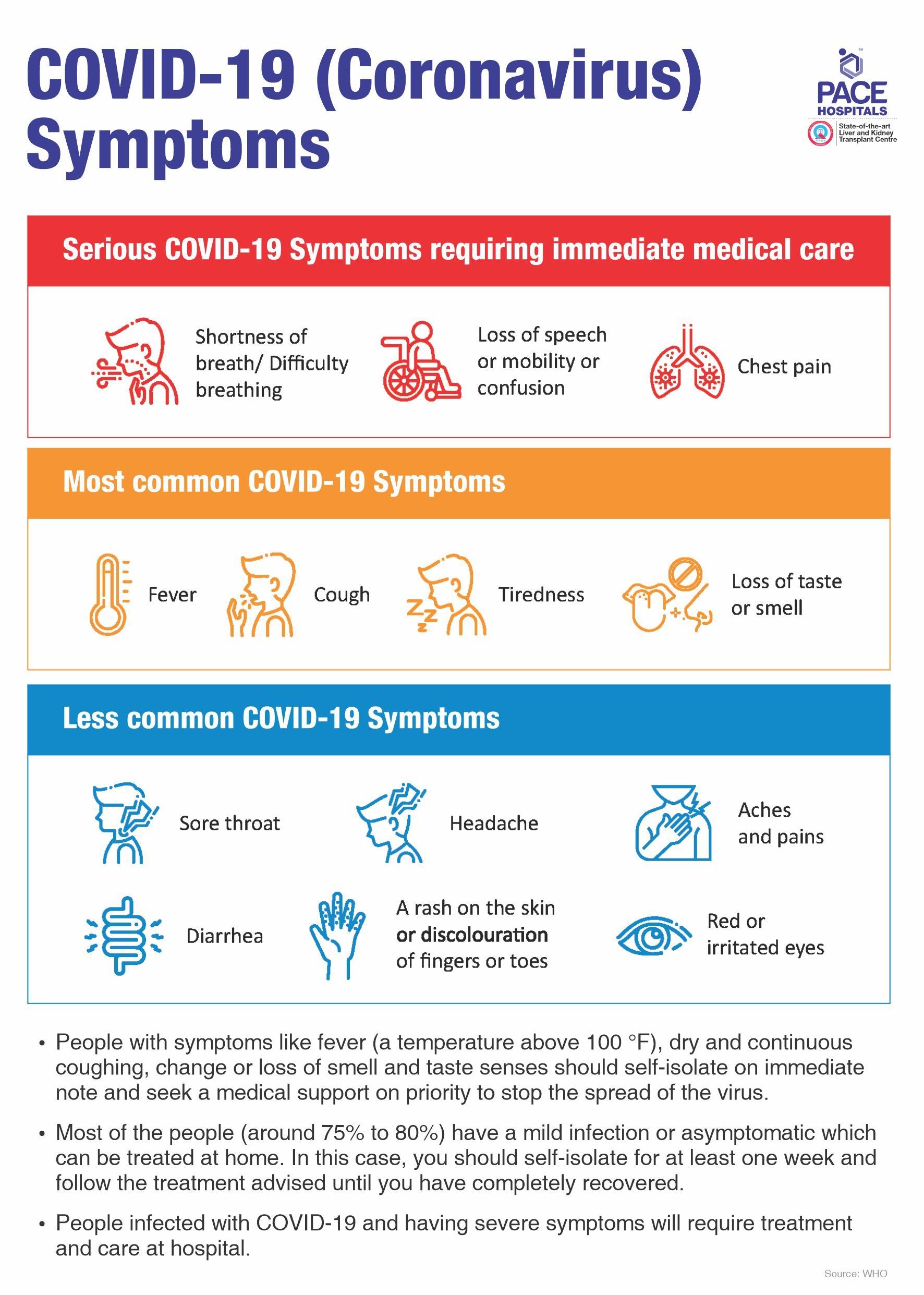Coronavirus - How to treat COVID-19 at home isolation | Self Care Treatment Guidelines
PACE Hospitals
Many people those who are infected with COVID-19 (coronavirus) may experience a mild symptoms or completely asymptomatic, can be treated at home. In this case what to do to feel better if having signs or symptoms of virus?
What are the symptoms?
People may be sick for 3 to 14 days before developing any symptoms. Rarely, the disease can be serious and even fatal. The most common symptoms of coronavirus (COVID-19), include:
- Difficulty breathing or shortness of breath
- Fever (a temperature above 100 °F)
- Dry, continuous coughing
- A change or loss of smell and taste senses
- Tiredness or fatigue
- Aches and pains
- Runny nose
- Headaches
- Nausea
- Sore throat
As per recent updates COVID-19 second wave is reporting modified 3 new symptoms apart from above observed symptoms:
- Hearing Impairment
- Pink Eye (Conjunctivitis)
- Impact the upper respiratory tract
People with symptoms like fever (a temperature above 100 °F), dry and continuous coughing, change or loss of smell and taste senses should self-isolate on immediate note and seek a medical support on priority to stop the spread of the virus. If experiencing any of the above symptoms visit nearby testing centre for COVID testing and share the reports while booking online video appointment to start the medical treatment or you can call us at 04048486868, we are available 24x7 to guide.
You can call us at 7842171717 for an emergency attention, if experiencing any of these:
- Not able to cope up with the symptoms at home.
- In case of condition is getting worse.
- After a week still having fever and feeling unwell simultaneously developed other symptoms.
- Not able to perform daily routine task and completely feeling exhausted.
Take Care of Yourself Every Day
During COVID-19 infection period it’s not easy to perform the continuous cycle of work, get a regular sleep and other task. Taking care of yourself is crucial for your recovery and following steps will help you to get a complete cure and get rid of the contagious virus; during this you should:
- It's important for your body to have plenty of fluids each day. Dehydration can make symptoms worse and cause other health problems.
- Drinking plenty of fluids that will make you hydrated. Watch your urine color, pale yellow urine means you are more hydrated.
- Self-monitoring daily temperature is essential and strongly advised. Temperature of 100.4 F (38º Celsius) or greater is considered as fever.
- Avoid consuming alcohol, this can weaken your immune system, lead to liver damage, may trigger emotional or past traumatic experiences, increases depression and anxiety simultaneously will make you more dehydrated.
- Get a good rest and self-isolate yourself at home. Proper rest is important for boosting the body's immune system and allowing it to fight with virus.
- Avoid any vigorous activities like aerobics, running, jogging etc.
- Follow the treatment as advised, if having any emergency signs or symptoms get worse call for help.
- Strictly follow home quarantine, do not go outside for public place or work. Get other helps to bring the required items and your supplies.
- Cover coughs and sneezes with your elbow or if using tissue, throw the tissue away and then wash hands right away. It’s important to wash your hands with soap and water for at least 20 seconds, or use alcohol-based hand sanitizer.
- Stay in a room that is not connected and having any access to others and use a separate bathroom from other people in the home.
- A well-ventilated room with cross ventilation and windows should be kept open to allow fresh air to come in.
- Use separate utensils and do not share these with other household members. After use, thoroughly wash them using soap and hot water.
- Do not allow visitors, friends or other members into your place. It's advised to wear a medical grade face mask, if they must be around other people.
How to check blood oxygen (Spo2) level at home?
Monitoring of blood oxygen level (SpO2) with a pulse oximeter is strongly advised.
- Turn on the Pulse Oximeter, ensure its in working condition and digits are visible.
- Clean finger with sanitizer or alcohol-based wipe before use.
- Insert the finger correctly within the Oximeter and allow a few seconds for the Pulse Oximeter to detect the pulse and display the oxygen saturation (SpO2) levels.
- Check oxygen levels 4 hourly 4 times in a day and make a note of the reading.
- Normal: SpO2 should be 95% or above
- IF SpO2 below 95 %, then seek immediate medical attention
Taking Care of someone with COVID-19 at home and providing support to cope with symptoms
You can safely help a family member to cope with coronavirus symptoms at home, while protecting yourself and anyone else you live with.
- Make sure they’re drinking plenty of fluids each day, drinking plenty of fluids that will make them hydrated. Dehydration can make symptoms worse and cause other health problems.
- Wash your hands often with soap and water for at least 20 seconds or use hand sanitizer that contains at least 70% alcohol, especially after being near the person who’s sick. Don't touch your eyes, nose, and mouth with unwashed hands.
- The caregiver should wear a 3 layer medical grade mask and N95 mask may be considered when in the same room with the infected person. Discard the mask after use and perform hand hygiene after disposal of the mask.
- The person with COVID-19 should separate themselves from others in the home, should use a separate bedroom and bathroom. Everyone in the household should stay at least 6 feet away from the infected person as often as possible.
- Wearing eye protection (googles or specs) when you’re near the person with COVID-19 can protect from getting virus directly into the mucus membranes of the eyes.
- Closely monitor day by day COVID-19 symptoms and if showing any of emergency signs, seek medical care immediately.
- If someone in your home has tested positive for COVID-19,
get yourself tested as soon as possible. Avoid meeting others till the complete recovery of the person you are caring at home.
Get Home Care Treatment support for suspected or diagnosed COVID-19 patient to recover while in home quarantine
When to seek emergency medical care?
If someone is showing any of these signs, immediately seek emergency medical care:
- Inability to wake or stay awake
- If oxygen saturation level (SpO2) is less than 94% on room air
- Persistent pain or pressure in the chest
- Confusion and drowsiness
- Trouble or difficulty breathing
- Bluish lips or face
Medications
Currently, there is no cure for COVID-19. The Treatment aim is to manage and reduce symptoms until you have completely recovered.
Most of the people (around 75% to 80%) have a mild infection or asymptomatic which can be treated at home. In this case, you should self-isolate for at least one week and follow the treatment advised until you have completely recovered.
People infected with COVID-19 and having severe symptoms will require treatment and care at hospital. People with other medical conditions (such as diabetes, hypertension, end stage kidney disease on hemodialysis / CAPD, asthma, cirrhosis, lymphoma, leukaemia, myeloma, diagnosis of any solid cancer, HIV infection, coronary artery disease or heart disease) may be in a risk of developing severity or critical infections.
Mostly viral infections such as common cold and flu such as paracetamol are widely recommended on medical advice. Do not take antibiotics as a self-medication to treat coronavirus antibiotics which haven't been prescribed for a certain condition.
How long should you stay in home isolation?
Speak to your doctor about how long you should self-isolate if having any symptoms. As per experts you can come out from self-isolation, when all these results are correct:
- From last 3 days not having fever.
- Your respiratory system is better and not having shortness of breath and coughing.
- It’s been 14 days since you infected from coronavirus and last two COVID-19 tests are negative.
Based on patients conditions and stage of the infection can be categorized as asymptomatic, mild, moderate, severe and critical cases. What does this mean?
Treatment Rumors by Traditional Methods
There are many natural and herbal 'drugs' ideas that is available on the internet and some of the shops. At present, there is no such evidence and medicine to cure Covid-19, so don't be fooled by the 'miracle' care that is selling by several people who all are claiming the complete cure.
Share on
Request an appointment
Fill in the appointment form or call us instantly to book a confirmed appointment with our super specialist at 04048486868
Appointment request - health articles
Recent Articles


